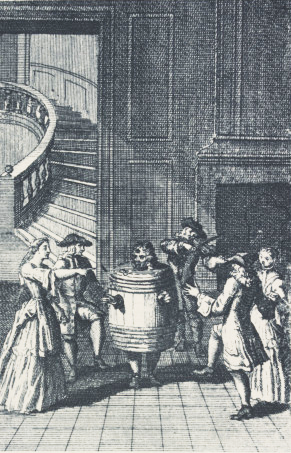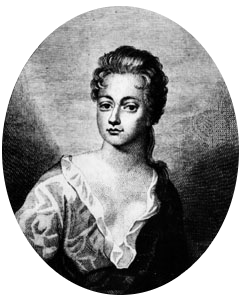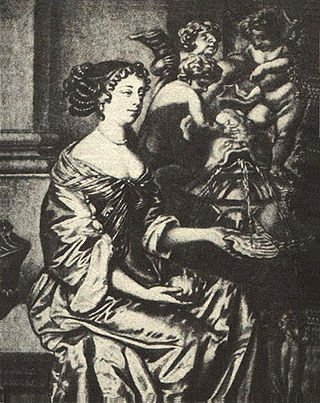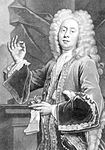
"Restoration comedy" is English comedy written and performed in the Restoration period of 1660–1710. Comedy of manners is used as a synonym for this. After public stage performances were banned for 18 years by the Puritan regime, reopening of the theatres in 1660 marked a renaissance of English drama. Sexually explicit language was encouraged by King Charles II (1660–1685) personally and by the rakish style of his court. Historian George Norman Clark argues:
The best-known fact about the Restoration drama is that it is immoral. The dramatists did not criticize the accepted morality about gambling, drink, love, and pleasure generally, or try, like the dramatists of our own time, to work out their own view of character and conduct. What they did was, according to their respective inclinations, to mock at all restraints. Some were gross, others delicately improper.... The dramatists did not merely say anything they liked: they also intended to glory in it and to shock those who did not like it.

Elizabeth Barry was an English actress of the Restoration period.

Thomas Patrick Betterton, the leading male actor and theatre manager during Restoration England, son of an under-cook to King Charles I, was born in London.
Susanna Verbruggen, aka Susanna Mountfort, was an English actress working in London.

The Provoked Wife (1697) is the second original comedy written by John Vanbrugh. It made its first appearance in Lincoln's Inn Fields in May, 1697. The often-repeated claim that Vanbrugh wrote part of his comedy The Provoked Wife in the Bastille is based on allusions in a couple of much later memoirs, but is regarded with some doubt by modern scholars. It is different in tone from his first play, the largely farcical The Relapse, and adapted to the greater acting skills of the new company of actors chosen for its premiere, who walked out not long before in a dispute with management. The actors' cooperative boasted the established star performers of the age, and Vanbrugh tailored The Provoked Wife to their specialties. While The Relapse had been robustly phrased to be suitable for amateurs and minor acting talents, he could count on versatile professionals like Thomas Betterton, Elizabeth Barry, and the rising young star Anne Bracegirdle to do justice to characters of depth and nuance.

Anne Bracegirdle was an English actress.

Mary Saunderson (1637–1712), later known as Mary Saunderson Betterton after her marriage to Thomas Betterton, was an actress and singer in England during the 1660s and 1690s. She is considered one of the first English actresses.

The United Company was a London theatre company formed in 1682 with the merger of the King's Company and the Duke's Company.

Cave Underhill (1634–1710?) was an English actor in comedy roles.

Love for Love is a Restoration comedy written by English playwright William Congreve. It premiered on 30 April 1695 at the Lincoln's Inn Fields Theatre. Staged by Thomas Betterton's company the original cast included Betterton as Valentine, William Smith as Scandal, John Bowman as Tattle, Thomas Doggett as Ben, Samuel Sandford as Foresight, William Bowen as Jeremy, John Freeman as Buckram, Anne Bracegirdle as Angelica, Elizabeth Bowman as Mrs Foresight, Elizabeth Barry as Mrs Frail, Elinor Leigh as Nurse and Abigail Lawson as Jenny.

Thomas Walker (1698–1744) was an English actor and dramatist.
William Bowen (1666–1718) was a British stage actor. He was part of the United Company from 1689. For a time, he became known for his comic roles. He was fatally wounded in a duel with fellow actor James Quin in 1718.
Joseph Williams was an English stage actor of the seventeenth and early eighteenth century.
Mary Willis was a British stage actress of the eighteenth century.
Elinor Leigh was a British stage actor of the seventeenth century.
The Innocent Mistress is a comedy written by Mary Pix, first performed in 1697.
George Bright was an English stage actor of the seventeenth and early eighteenth century. He specialised in playing "comic dullards, fops and bouncy servants". After beginning his career in Dublin he joined the Duke's Company at the Dorset Garden Theatre in 1679 and then became part of the merged United Company in 1682.
Elizabeth Bowman was an English stage actor of the seventeenth and early eighteenth century. The daughter of Sir Francis Watson, 1st Baronet she was adopted by the actor manager Thomas Betterton. In 1692 she married John Bowman and began acting at Drury Lane the following year as Mrs Bowman. She was a member of the United Company until 1695 then joined Betterton's breakaway at the Lincoln's Inn Fields Theatre.

The She-Gallants is a 1695 comedy play by the English writer George Granville. It was first staged by Thomas Betterton's Company at the Lincoln's Inn Fields Theatre in London.














